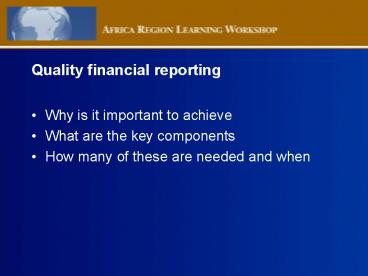Quality financial reporting - PowerPoint PPT Presentation
1 / 12
Title:
Quality financial reporting
Description:
Conceptual framework project at IASB. Wide range of users of financial ... Monitoring systems: internal control systems including scrutiny and internal audit ... – PowerPoint PPT presentation
Number of Views:28
Avg rating:3.0/5.0
Title: Quality financial reporting
1
Quality financial reporting
- Why is it important to achieve
- What are the key components
- How many of these are needed and when
2
Why is financial reporting important?
- Conceptual framework project at IASB
- Wide range of users of financial information
- Financial information for investment and credit
decisions - Assessing future cash flows (or management
performance) - Relevant information
- Faithful representation - verifiable, neutral,
complete - Comparable
3
Why is financial reporting important?
- Financial information for decision-making
- Allocation of resources
- Performance of projects, enterprises, management
- Importance of financial reports stock markets,
owner-managers - Part of the economic infrastructure
- Reporting on the public record alternative
models
4
Financial reporting - key quality components
- Financial reporting supply chain
- Businesses - preparers
- Users owners, lenders, business partners,
employees - Auditors
- Clear rules
- Monitoring systems
5
(No Transcript)
6
Key components - businesses
- Financial managers to directors
- Audit Committee
- Rules accounting standards and policies of the
organisation - Monitoring systems internal control systems
including scrutiny and internal audit
7
Key components companies to users
- Rules accounting standards and corporate
governance codes - Monitoring systems
- Auditors
- Enforcement mechanism review panel, regulator
- Other commentators analysts, press
8
Key components auditors
- Rules auditing standards
- Monitoring systems
- firms quality control systems
- audit regulator, professional bodies
- oversight bodies
9
Key components professionalism
- Access to the standards, support for
implementation, knowledge and understanding - Pace of change and complexity in the standards
- Qualifications, CPD
- Ethics conflicts of interest, competence etc.
- Rules and monitoring systems for these
10
How many of these components are needed?
- Cost/benefits of regulation and of failure
- Different priorities for different places
- For different cases
- Demand from interested parties
- International expectations
- Build on experience elsewhere or imposition of
over-elaborate models?
11
Evolution in UK as an example
- Audit 19th century
- Professional institutes 19th century
- Accounting standards 1970, 1990, 2005
- Corporate governance codes 1992
- Enforcement of standards 1990
- Auditing standards 1975
- Audit monitoring 1980
- Oversight 2000, 2004
12
Summary
- It is important
- A number of parties involved financial
reporting supply chain - Clear rules/standards at each stage
- Monitoring mechanisms
- Quality of the people involved in the process
- How much regulation and when flexibility,
cost/benefit































